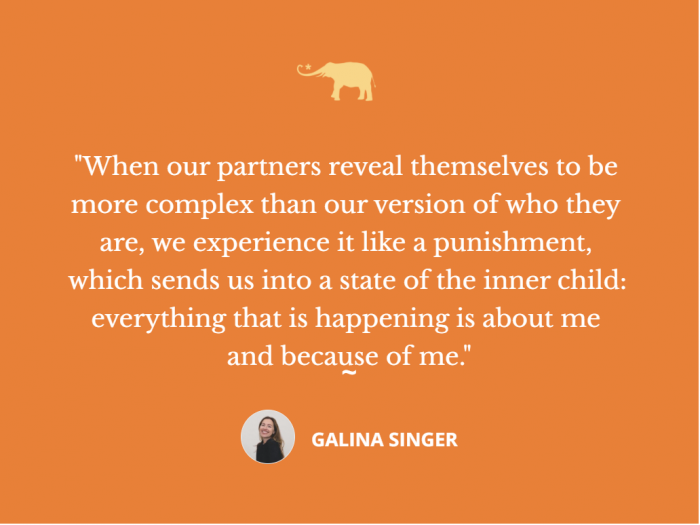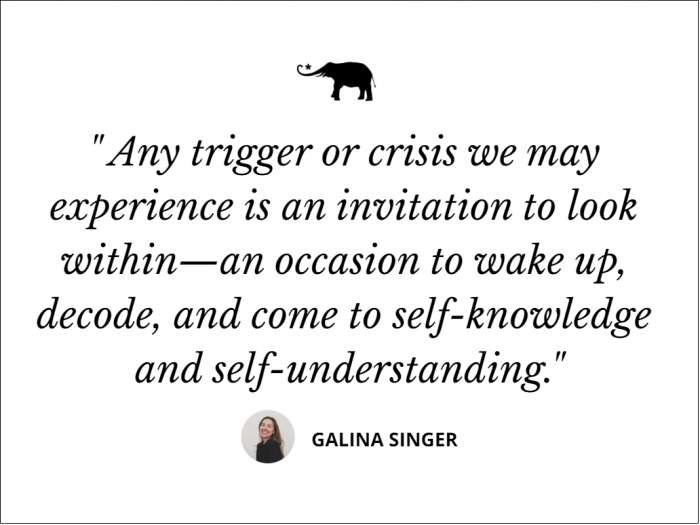View this post on Instagram
>> I just feel so betrayed!
>> Did your husband have an affair?
>> Oh God, no! No-no, he would never do that!
>> So then—how did he betray you?
From my conversation with a therapist several years ago.
What shook me to the core and had me feel so betrayed was simply that life revealed my husband to be a regular guy. He ended up being himself, and not the knight in shining armor I so desperately needed him to be, holding him accountable to it for most of our decades-long marriage.
This was one of many cognitive dissonances I experienced over the last years, which brutally awakened me to the fact that I have lived in a romantic coma for most of my life.
Raised by a mother who felt betrayed by my father, I investigate what we call betrayal in relationships. I find that, while we often demonize the person who does the presumed betraying, it is often the expectations of the betrayed that are at the source of all the pain.
Since so many of our expectations about people, love, and relationships that we have inherited from the old paradigm are based on illusions and falsehoods, our definition of betrayal is due for a revisit as well.
I personally have been betraying myself since childhood.
Taught to bend to the will of those on whom I felt dependent for survival, I have suppressed my nature in order to fit in. Having observed that being myself meant losing love, I have locked away the unpopular pieces of myself so securely that I’d forgotten about their existence.
Navigating the world from masks and pretenses, I have betrayed everyone else with whom I was in relationships, whether romantic or professional. Faking it till I made it, I stuffed myself into an idealized and sterile version of myself in order to control and manipulate other people’s perceptions of me. Until recently, no one knew who I was—including me.
This is the kind of betrayal that happens systematically in our families, in our work spaces, and society at large, but is accepted in our culture as the standard for normal behavior.
In such a world, what we call betrayal is actually learning truths about people that we were not aware of before. Often we find them out by accident since so many of us feel compelled to keep certain parts of our nature a secret, ashamed since childhood of who we are.
Any discrepancy between the image we have created about our partners—a composite of our unconscious urges, childhood dreams, and conditioned desires—and who they actually are becomes a source of pain and anger.
What seems to compound the pain of the betrayed partner is the tendency to take the behavior of the other personally.
The medieval rules for family and relationship allegiances we still live by have trained us to view other people’s behavior as a reflection of our honor and value, while we believe that their thoughts, behavior, and genitals belong to us.
Our sense of well-being is conditional on our partner’s willingness to remain in a box that we have erected for them in our own imagination. When they show us a wider range of their human nature, we tend to view it as something threatening and destructive, like it was “done to us,” ignoring the fact that our partner is a person in their own right, sovereign, imperfect self—continuously evolving.
Most of our relationships are recreations of our childhood dynamics, founded on assumptions, expectations, and unwritten rules. Few of us ever witnessed difficult conversations modeled by our parents gracefully. We grow up fearing conflict and deny any reality that differs from our own, all while loudly demanding the truth that we are unable to handle.
Occasions like infidelity definitely carry co-creative responsibility, which most of us find difficult to accept.
No one can betray us when we are not already betraying ourselves through disconnecting from our needs, our authentic self-expression, and our intrinsic sense of worth.
Any perceived betrayal in relationships reawakens our memory of disempowerment and suspicion that we are not worthy of love. Used to manipulate others through sacrifice and self-betrayal, we attach to a false sense of control. When our partners reveal themselves to be more complex than our version of who they are, we experience it like a punishment, which sends us into a state of the inner child: everything that is happening is about me and because of me. Without the ability to understand that other people are sovereign and not “ours,” we cannot comprehend that they may have thoughts, feelings, attractions, and desires outside of their relationship with us.
Our fear of change and attachment to the ideas of how life should be or how it used to be prevent us from the natural unfolding of ourselves, our lives, and our relationships.
Coming to wholeness is a basic need, driven by an evolutionary pull. Our nature will demand to be known, attracting us to experiences and relationships that will help us remember what we’ve hidden in our unconscious long ago.
The way I view it, our relationships are here to help wake us up to who we are.
I believe that relationships act as our mirrors, reflecting some parts of ourselves that we have lost connection to. Some people come into our lives specifically to ignite our process of self-remembering. For that reason, I believe that we need many different relationships, as every new person brings to our awareness a new dimension of our hidden nature.
Via strong emotional reactions, our relationships awaken us to the implicit relating patterns within us. Whether we feel loved or betrayed, we attribute this state to the person with whom we are relating. What is actually happening has less to do with that person and more with the fact that they evoke a familiar template from our childhood experiences, an emotional imprint that is activated through the current dynamic.
Any trigger or crisis we may experience is an invitation to look within—an occasion to wake up, decode, and come to self-knowledge and self-understanding.
The majority of us, however, choose to blame the other for our pain and/or numb out with alcohol, distractions, or avoidance, remaining blind to who we are. When we blame other people for our difficult feelings, we deprive ourselves of the possibility for self-exploration and self-compassion.
For as long as we believe the fault is on the outside, we do not grow. By demanding that our partners fit into our expectations of who they are, we recreate our childhood dynamic in our romantic relationships, demanding that our partners slice off the inconvenient parts of who they are.
Of course, when we have not recalled the discarded parts of ourselves and continue relating from behind the masks we’ve adopted as children, we will be unable to tolerate the complexity in our partners.
When we find ourselves in a relationship where there is no growth, then we are not relating.
Relating is a moment-to-moment data streaming from me to you and from you to me, during which we can update the information about each other. If we are not present for learning through our relationships, then we are not present for the relating. The distance between the image we have of each other and who we actually are will become increasingly palpable and will eventually push the participants to seek a connection elsewhere.
A relationship can only be sustained when it accommodates the growth of the people in it. We can only evolve within a relationship if there is space to shift and grow, and when we feel safe to communicate truthfully and regularly. When we fear to be known—to reveal our soft spots for fear of judgment, then the relationship becomes a prison, which may explain why so many of us feel trapped.
We’ve been brought up valuing the relationship more than the people who form it. Attachment won over authenticity, as we focused on scarcity, survival fears, and longevity. Today, we want more from our relationships but are stuck in inherited patterns of the past.
Learning to show up in new ways in our relationships would serve us well. That means taking the time to understand who we are, mature through self-study, gain emotional depth, and learn to communicate from the inside out.
When we learn to decondition from our inherited limiting beliefs, address and heal our fears and anxieties, and learn self-responsibility, we can start to relate in ways that bring more connection and fulfillment, where we no longer need to betray ourselves or each other.
Learn how to build fulfilling relationships while prioritizing your relationship with yourself. Contact me for a free introductory conversation.
~


 Share on bsky
Share on bsky






Read 64 comments and reply